DE BODEMVERENIGING - EEN ZEER VISSIGE ZALMHANDEL
07.11.2024
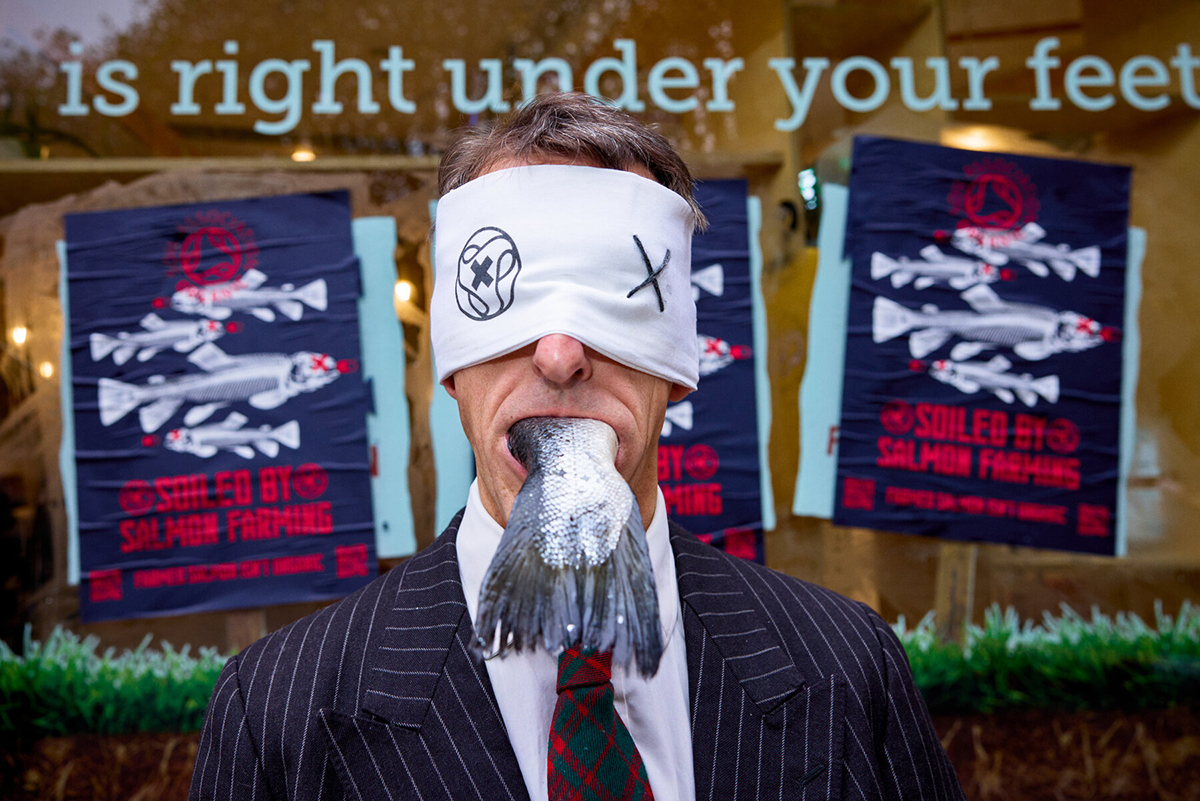
⬆️ De Soil Association is blind voor de benarde situatie van gekooide zalm. Gekooide zalm sterft regelmatig in krappe kooien vol zeeluis, pesticiden en uitwerpselen.
Vandaag hebben we in Bristol de Bodemvereniging om hen eraan te herinneren dat ze moeten stoppen met het certificeren van zalmkwekerijen als biologisch (want dat is het niet).
Het bezoek viel samen met hun online AGM-vergadering. We hopen dat het hen heeft herinnerd aan hun plicht tegenover het milieu. Om ze verder op weg te helpen bezorgden onze zalmkoppen een brief waarin stond waarom we kwamen.
Het lot van de oceaan hangt van ons allemaal af.
Onze interventies zijn afhankelijk van uw steun.
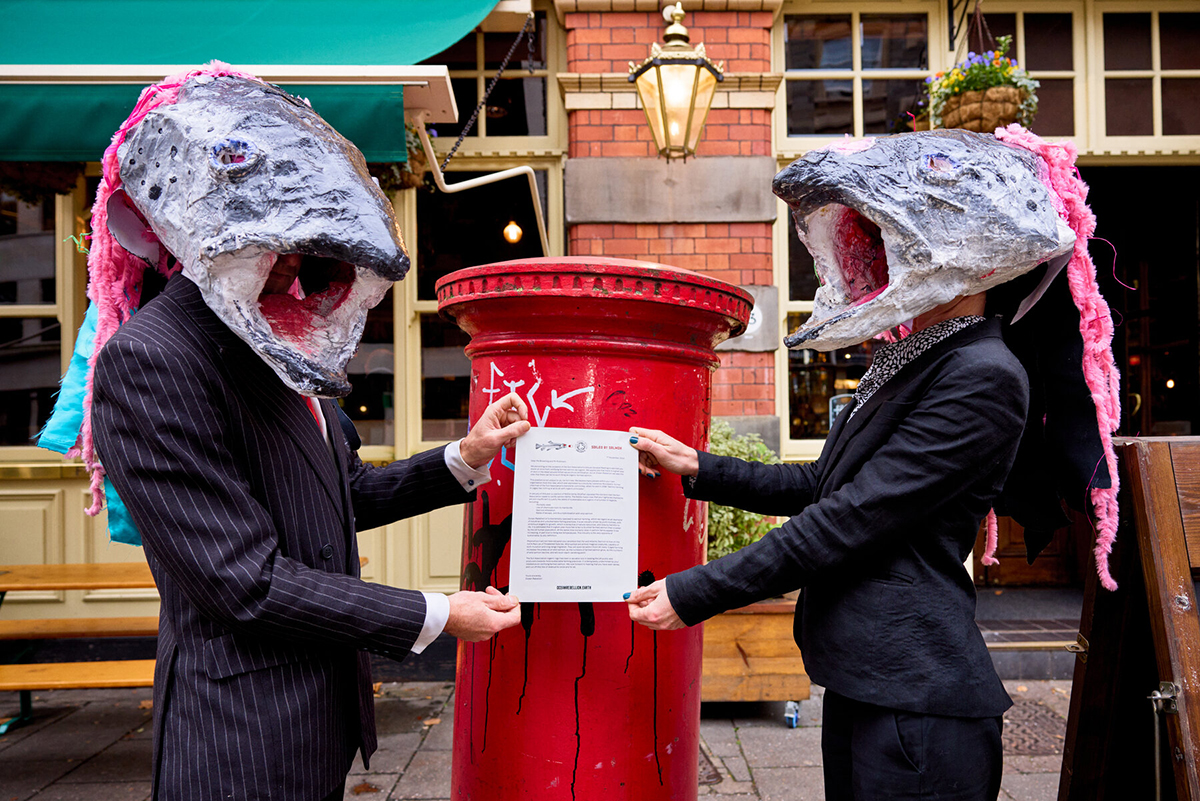
⬆️ Onze zalmhoofden bereiden de brief voor alvorens hem af te leveren bij de Soil Association. Een postzegel was niet nodig, onze brief werd netjes afgeleverd.
⬇️ In de brief, gericht aan de Chief Executive en CEO, worden de nadelen van het kweken van zalm uiteengezet.
⬇️ En als je meer wilt weten over de vele problemen met het kweken van zalm, bekijk dan de film hieronder.
Na het bezorgen van de brief plakten de twee boze zalmambassadeurs posters op de ramen van de Soil Association en poseerden ze voor de pers. We hopen dat de boodschap overkomt bij de vele supermarkten zoals Tesco, Waitrose en M&S die 'biologische' zalm verkopen. Door certificeringsprogramma's zoals het 'Organic' label van de Soil Association of soortgelijke programma's te ondersteunen door de RSPCA, Raad voor Aquacultuurbeheer (ASC) en de Marine Stewardship Council deze winkeliers liegen tegen hun klanten. De citaten hieronder laten zien hoezeer deze regelingen een leugen zijn:
"In totaal zijn er momenteel 14 zeewaterzalmkwekerijen in Schotland biologisch gecertificeerd: zeven Mowi Scotland-kwekerijen, vijf kwekerijen van Cooke Aquaculture en twee kwekerijen van Organic Sea Harvest Ltd"(Wildvis, 2023). Bij de misplaatste introductie van het 'biologische' zalmsysteem van de Soil Association in 2006 zei een voormalig voorzitter van de normcommissie: "Het kweken van zalm in kooien heeft helemaal niets te maken met biologische principes. In tegenstelling tot de belofte van de Soil Association om "de hoogst mogelijke normen voor dierenwelzijn te garanderen", is biologische certificering ook geen garantie voor lage niveaus van lijden of sterfte. De Culnacnoc kwekerij van Organic Sea Harvest had eind 2022 te maken met een ernstige sterfte, waarbij meer dan een half miljoen (520.638) gekweekte zalmen verloren gingen in een periode van 6 weken. Lijdend aan een veelheid van aandoeningen (parasitaire, virale en milieuschade) die een ernstige kieuwziekte veroorzaken, stierven maar liefst 325.000 vissen in één week. De vissen die overleefden bleven gecertificeerd als biologisch door de Soil Association" (Wildvis, 2023).
Het kweken van zalm gaat gepaard met problemen. Het kweken van vis en soja om gekweekte zalm te voeden is beschreven als neokolonialisme, het vernietigen van de voedselzekerheid van hongerige mensen in armere landen en het vernietigen van de regenwouden waar soja wordt gekweekt. Uitwerpselen van zalm, ziektes, parasieten, pesticiden en medicijnen worden als de wiedeweerga in het Schotse zeemilieu gegoten en vernietigen de ecosystemen waarvan kwetsbare kustgemeenschappen afhankelijk zijn voor hun levensonderhoud. Enorme hoeveelheden microplastics komen in zee terecht wanneer de gekooide zalm in plastic voederbuizen bijt. En de afschuwelijke wreedheid van de zalmkweek verandert de zalm in nauwelijks levende zombie-achtige wezens, doorzeefd met verwondingen en ziektes, krioelend van de zeeluis, rondzwemmend in overvolle kooien in afwachting van hun verscheping naar de Britse supermarkten (als ze niet eerder sterven en begraven worden als vuilnisbelt) is aan het licht gebracht door activisten en klokkenluiders en veroorzaakt regelmatig voedselschrikken en welzijnsverontwaardiging in de media.
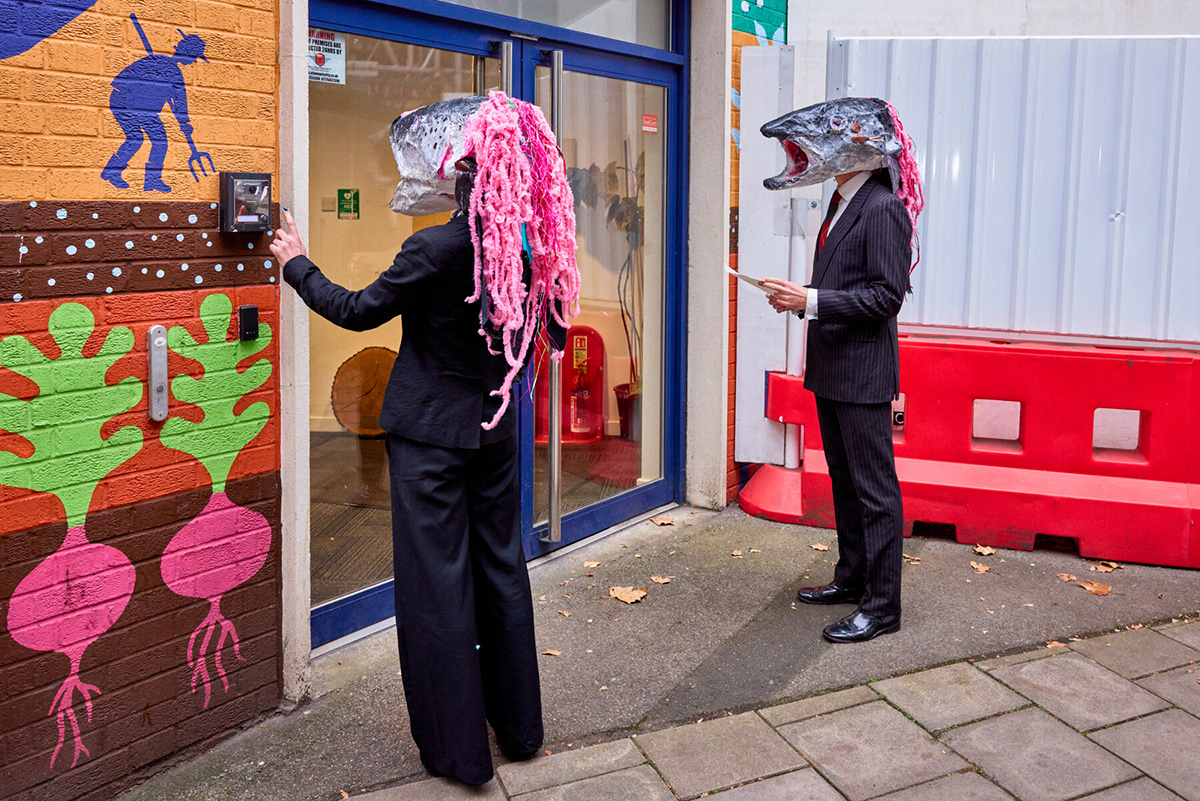
⬆️ Ding dong zalm roept. Onze zalmkoppen bezorgen de brief aan de Het hoofdkantoor van Soil Assocation in Bristol.
Ondanks hun beweringen van het hoogste niveau van dierenwelzijn te bieden, de gezondheid van mens en dier te beschermen, het milieu te beschermen en de belangen van de biologische consument te behartigen,"(Normen voor biologische aquacultuur van Soil Association 2024) De Soil Association helpt de Schotse zalmindustrie door de gruwelijke misstanden rond het welzijn van miljoenen gekweekte zalmen te verbergen achter haar gecertificeerde etikettering. En de giftige soep waarin de zalmindustrie de zalm dwingt te zwemmen is allesbehalve 'biologisch'.
Lees deze reactie van de Soil Association op een van onze recente Instagram-posts:
Wij vinden dat de Soil Association moet stoppen met het certificeren van zalmkwekerijen en de certificeringen die ze al hebben afgegeven moet verwijderen. Dat is de enige manier waarop ze kunnen verzekeren dat ze niet liegen tegen consumenten. Een vis die antibiotica krijgt en in pesticiden zwemt, kan toch niet 'biologisch' genoemd worden?
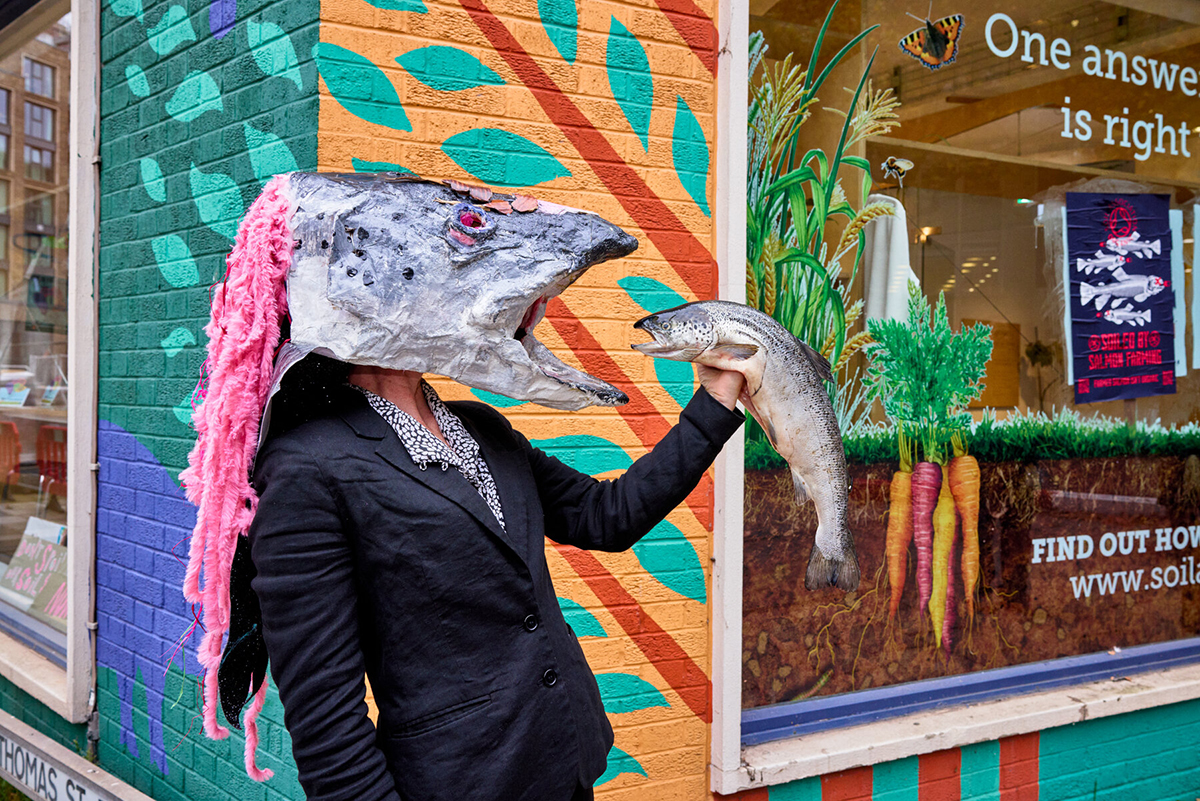
⬆️ Zalm ontmoet zalm.
⬇️ Alleen chips alsjeblieft.
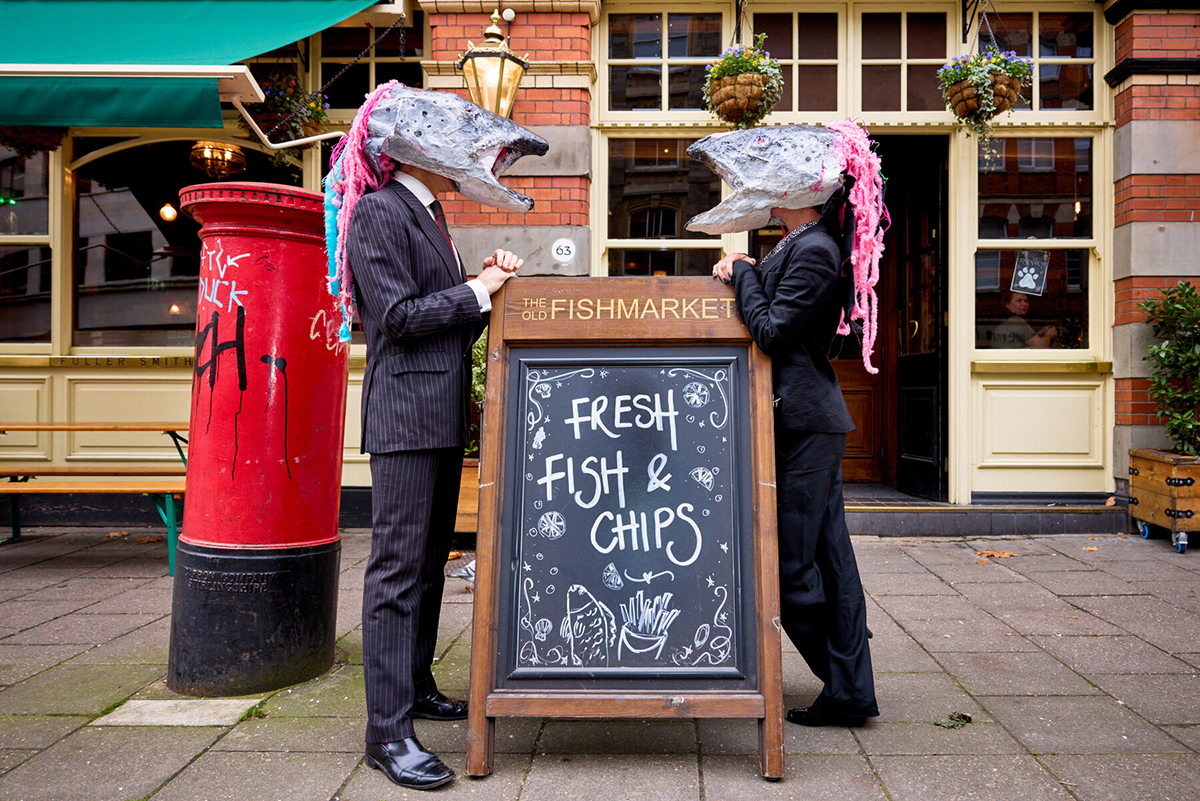
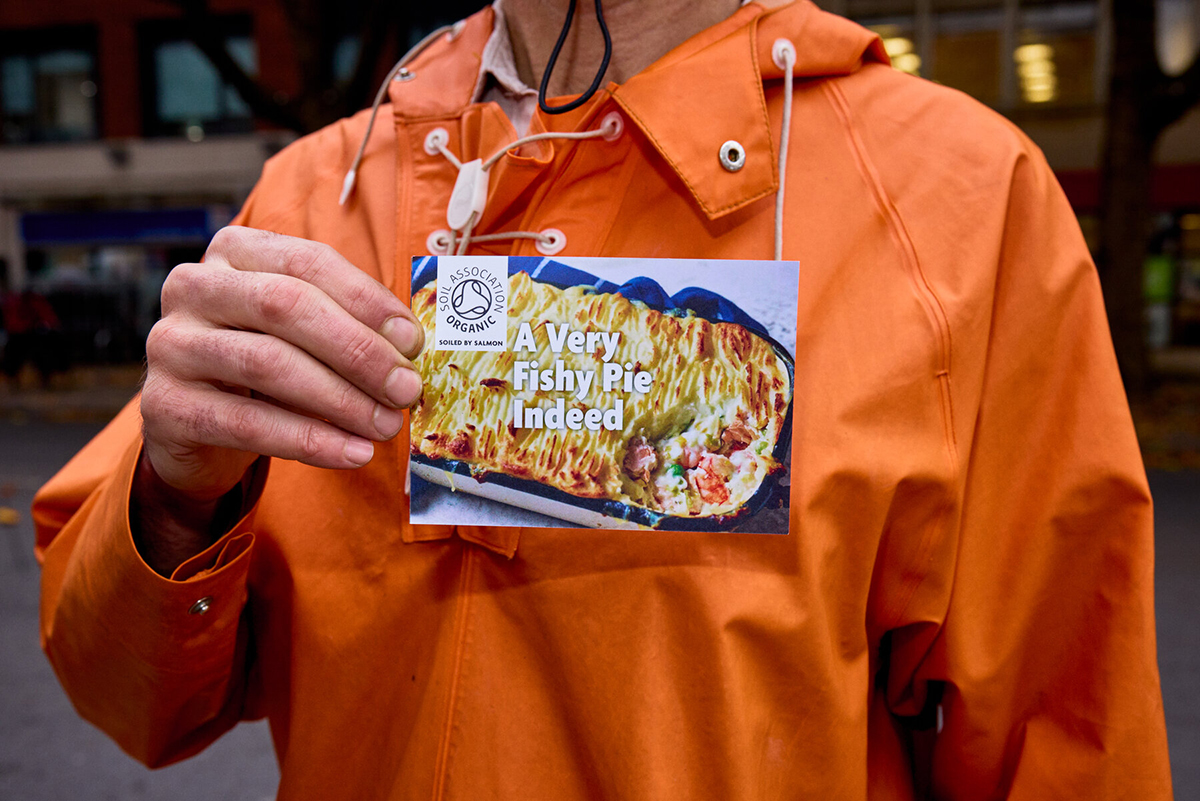
Inderdaad een erg visachtig recept. Download onze visreceptenkaart en deel het uit bij je plaatselijke supermarkt.
Alle foto's door Simon Holliday.